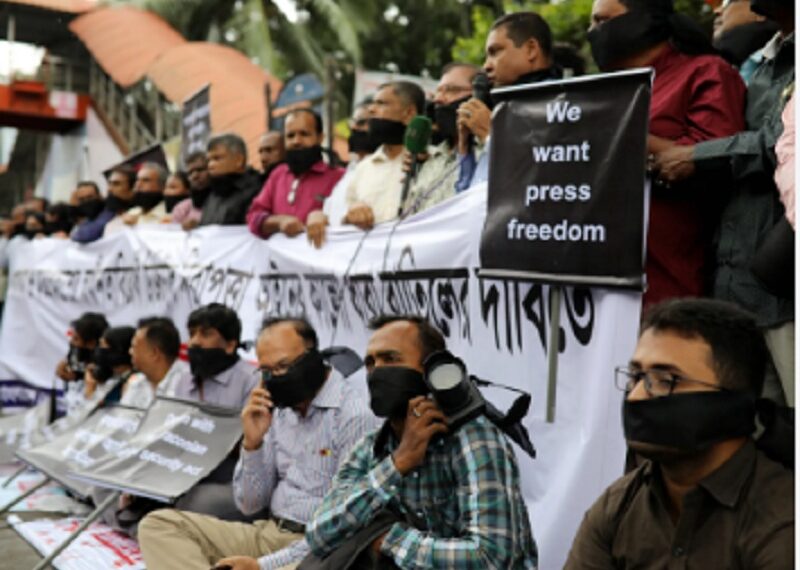In a hard-hitting statement, exiled Bangladeshi journalist Sumi Khan recently alleged that Bangladesh’s interim government, led by Nobel laureate Muhammad Yunus, has effectively stifled press freedom in the country following Sheikh Hasina’s ouster.
The claim, which has sparked widespread debate, raises critical concerns about the state of democracy and free speech in Bangladesh. Is the new administration indeed silencing dissent, or is this a necessary reset for a press landscape long accused of bias and political favouritism?
During Sheikh Hasina’s tenure, Bangladesh’s media landscape was often criticised for facing growing restrictions, including stringent digital laws, targeted arrests of journalists, and government influence over mainstream media.
The Digital Security Act (DSA), enacted in 2018, became a powerful tool to silence critics, journalists, and activists under the pretense of national security and misinformation control.
While Bangladesh witnessed remarkable economic progress under Hasina’s leadership, press freedom significantly deteriorated, with international watchdogs frequently ranking the country low on press freedom indices.
However, despite these restrictions, media houses in Bangladesh operated within a complex ecosystem where dissenting voices—albeit suppressed—found ways to reach the public.
The challenge for the new administration, led by Muhammad Yunus, was to balance press freedom while addressing the alleged corrupt media practices entrenched in the past.
Muhammad Yunus, best known for his work in microfinance, was an unexpected yet prominent figure to lead Bangladesh’s interim government.
His appointment came with a promise of democratic restoration and reform. However, Sumi Khan’s allegations suggest that the Yunus-led administration has instead intensified media repression, contradicting its proclaimed commitment to democracy.
According to Khan and several other exiled journalists, censorship has worsened under Yunus’ leadership.
Independent journalists report increased surveillance, closure of critical media outlets, and intimidation tactics targeting dissenting voices.
Government critics argue that rather than dismantling the suppressive mechanisms established under Hasina’s rule, Yunus’ administration has repurposed them to serve its own agenda.
One of the most alarming claims made by Khan is the outright elimination of Bangladesh’s free press.
She argues that the interim government’s intolerance for criticism has led to an information blackout, where only state-sanctioned narratives dominate the media.
Reports indicate that several prominent journalists have been detained or forced into exile, while news platforms critical of the new leadership have been either shut down or compelled to align with government policies.
In addition, there is growing concern about the continuation of restrictive digital laws.
Many had hoped that the departure of Sheikh Hasina would lead to a more open and transparent media environment, but there are now fears that the new government has inherited, rather than abolished, the tools of suppression.
Supporters of the interim government argue that any restrictions on the press are not meant to stifle freedom but to maintain national security and stability during a sensitive political transition.
They claim that certain media outlets have been engaged in misinformation campaigns that threaten to destabilize the country.
Given the history of politically motivated journalism in Bangladesh, Yunus’ administration may perceive tight media control as necessary to prevent further polarisation and unrest.
However, critics contend that this justification is merely a façade for continued oppression.
If the interim government truly seeks democratic restoration, they argue, it must allow a free and independent press to function without fear.
The international community has taken notice of these developments, with global press freedom organisations calling for increased scrutiny of Bangladesh’s media policies.
The Committee to Protect Journalists (CPJ), Reporters Without Borders (RSF), and Amnesty International have all expressed concern over the deteriorating press conditions under Yunus’ leadership.
The United Nations has also urged Bangladesh’s interim government to ensure media freedom and uphold democratic values.
Despite these pressures, there has been little sign of change.
Some analysts suggest that the transition period between Sheikh Hasina’s departure and a fully elected government might see further media clampdowns before any potential liberalisation.
The future of Bangladesh’s press freedom hinges on how Muhammad Yunus and his government navigate the transition toward democratic elections. Will they take concrete steps to restore media independence, or will they continue using suppressive tactics under a different banner?
ALSO READ: Bangladesh women rise up against increasing incidents of rape
As Bangladesh moves toward what could be a crucial turning point in its democratic evolution, the treatment of the press will serve as a litmus test for the interim government’s true intentions.
The world is watching closely, and so are the journalists who risk their safety to report the truth.
For now, the fear of censorship looms large, and as Sumi Khan and other exiled journalists have warned, Bangladesh’s free press may be on the brink of extinction.















